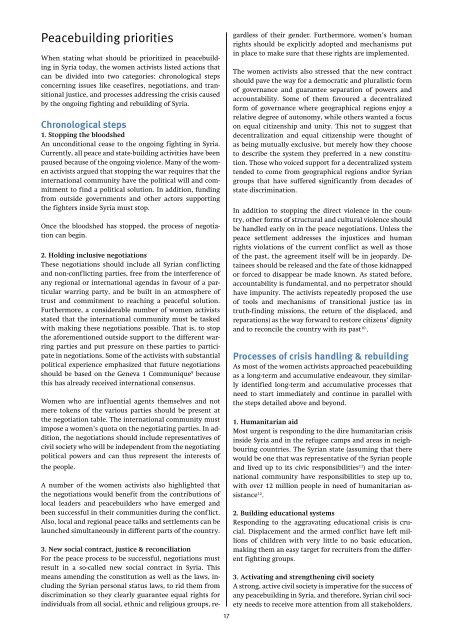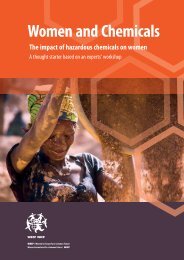future now”
YAO19
YAO19
You also want an ePaper? Increase the reach of your titles
YUMPU automatically turns print PDFs into web optimized ePapers that Google loves.
Peacebuilding priorities<br />
When stating what should be prioritized in peacebuilding<br />
in Syria today, the women activists listed actions that<br />
can be divided into two categories: chronological steps<br />
concerning issues like ceasefires, negotiations, and transitional<br />
justice, and processes addressing the crisis caused<br />
by the ongoing fighting and rebuilding of Syria.<br />
Chronological steps<br />
1. Stopping the bloodshed<br />
An unconditional cease to the ongoing fighting in Syria.<br />
Currently, all peace and state-building activities have been<br />
paused because of the ongoing violence. Many of the women<br />
activists argued that stopping the war requires that the<br />
international community have the political will and commitment<br />
to find a political solution. In addition, funding<br />
from outside governments and other actors supporting<br />
the fighters inside Syria must stop.<br />
Once the bloodshed has stopped, the process of negotiation<br />
can begin.<br />
2. Holding inclusive negotiations<br />
These negotiations should include all Syrian conflicting<br />
and non-conflicting parties, free from the interference of<br />
any regional or international agendas in favour of a particular<br />
warring party, and be built in an atmosphere of<br />
trust and commitment to reaching a peaceful solution.<br />
Furthermore, a considerable number of women activists<br />
stated that the international community must be tasked<br />
with making these negotiations possible. That is, to stop<br />
the aforementioned outside support to the different warring<br />
parties and put pressure on these parties to participate<br />
in negotiations. Some of the activists with substantial<br />
political experience emphasized that <strong>future</strong> negotiations<br />
should be based on the Geneva 1 Communique 9 because<br />
this has already received international consensus.<br />
Women who are influential agents themselves and not<br />
mere tokens of the various parties should be present at<br />
the negotiation table. The international community must<br />
impose a women’s quota on the negotiating parties. In addition,<br />
the negotiations should include representatives of<br />
civil society who will be independent from the negotiating<br />
political powers and can thus represent the interests of<br />
the people.<br />
A number of the women activists also highlighted that<br />
the negotiations would benefit from the contributions of<br />
local leaders and peacebuilders who have emerged and<br />
been successful in their communities during the conflict.<br />
Also, local and regional peace talks and settlements can be<br />
launched simultaneously in different parts of the country.<br />
17<br />
3. New social contract, justice & reconciliation<br />
For the peace process to be successful, negotiations must<br />
result in a so-called new social contract in Syria. This<br />
means amending the constitution as well as the laws, including<br />
the Syrian personal status laws, to rid them from<br />
discrimination so they clearly guarantee equal rights for<br />
individuals from all social, ethnic and religious groups, regardless<br />
of their gender. Furthermore, women’s human<br />
rights should be explicitly adopted and mechanisms put<br />
in place to make sure that these rights are implemented.<br />
The women activists also stressed that the new contract<br />
should pave the way for a democratic and pluralistic form<br />
of governance and guarantee separation of powers and<br />
accountability. Some of them favoured a decentralized<br />
form of governance where geographical regions enjoy a<br />
relative degree of autonomy, while others wanted a focus<br />
on equal citizenship and unity. This not to suggest that<br />
decentralization and equal citizenship were thought of<br />
as being mutually exclusive, but merely how they choose<br />
to describe the system they preferred in a new constitution.<br />
Those who voiced support for a decentralized system<br />
tended to come from geographical regions and/or Syrian<br />
groups that have suffered significantly from decades of<br />
state discrimination.<br />
In addition to stopping the direct violence in the country,<br />
other forms of structural and cultural violence should<br />
be handled early on in the peace negotiations. Unless the<br />
peace settlement addresses the injustices and human<br />
rights violations of the current conflict as well as those<br />
of the past, the agreement itself will be in jeopardy. Detainees<br />
should be released and the fate of those kidnapped<br />
or forced to disappear be made known. As stated before,<br />
accountability is fundamental, and no perpetrator should<br />
have impunity. The activists repeatedly proposed the use<br />
of tools and mechanisms of transitional justice (as in<br />
truth-finding missions, the return of the displaced, and<br />
reparations) as the way forward to restore citizens’ dignity<br />
and to reconcile the country with its past 10. .<br />
Processes of crisis handling & rebuilding<br />
As most of the women activists approached peacebuilding<br />
as a long-term and accumulative endeavour, they similarly<br />
identified long-term and accumulative processes that<br />
need to start immediately and continue in parallel with<br />
the steps detailed above and beyond.<br />
1. Humanitarian aid<br />
Most urgent is responding to the dire humanitarian crisis<br />
inside Syria and in the refugee camps and areas in neighbouring<br />
countries. The Syrian state (assuming that there<br />
would be one that was representative of the Syrian people<br />
and lived up to its civic responsibilities 11 ) and the international<br />
community have responsibilities to step up to,<br />
with over 12 million people in need of humanitarian assistance<br />
12 .<br />
2. Building educational systems<br />
Responding to the aggravating educational crisis is crucial.<br />
Displacement and the armed conflict have left millions<br />
of children with very little to no basic education,<br />
making them an easy target for recruiters from the different<br />
fighting groups.<br />
3. Activating and strengthening civil society<br />
A strong, active civil society is imperative for the success of<br />
any peacebuilding in Syria, and therefore, Syrian civil society<br />
needs to receive more attention from all stakeholders,



